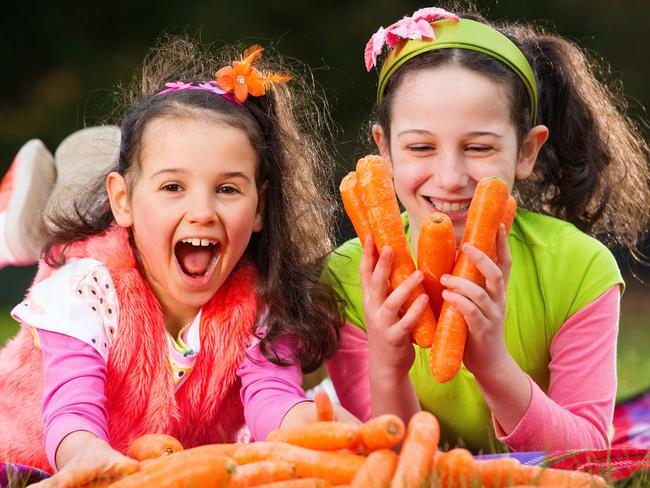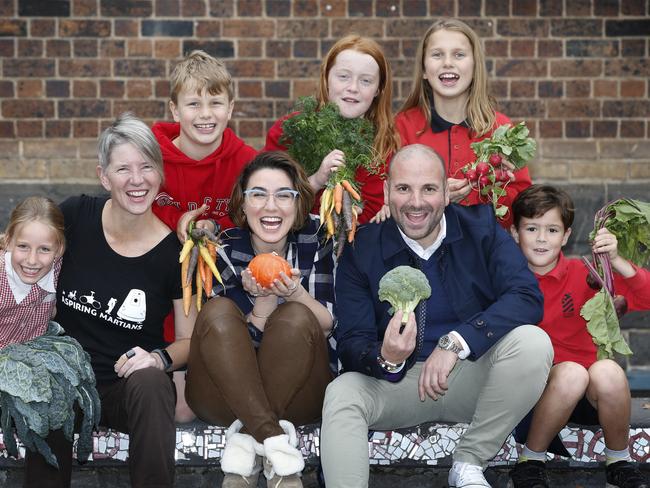Kids vegetable crisis: Children refusing veggies more than ever
KIDS as young as four are going days barely eating anything in an anti-vegetable crisis that has parents “tearing their hair out”. Here’s what you can do if your little cherub’s fussy eating habits are driving you mad.
Illness
Don't miss out on the headlines from Illness. Followed categories will be added to My News.
EXCLUSIVE
KIDS as young as four are going days without eating barely a thing or are only eating jam sandwiches for breakfast, lunch and dinner because of their aversion to vegetables.
Many are going as far as refusing to eat foods that aren’t white or are only eating chips, toast or fried food every meal of the day.
Childhood nutritionists are saying they are seeing a spike in the number of frustrated parents and children attending their clinics in a desperate bid to solve the anti-vegetable crisis.
It’s the worst they have ever seen it and backs up Australian Bureau of Statistics data that shows only 5 per cent of Australian kids are getting their daily recommended intake of vegetables.
MORE: Parents spending up to $1000k a year per child on gym memberships for kids
MORE: Aussie kids addicted to devices, here’s what you can do to minimise screen time
MORE: Demanding job? You might be risking your child’s mental health

Picture: Mark Stewart
While fruit consumption is on the rise, vegetable consumption has fallen.
Just 5.4 per cent of 2-18-year-olds were meeting the minimum five serves of vegetables a day in 2014-15.
This was down from 5.7 per cent in 2007 and one in four Aussie kids is now considered overweight or obese with childhood obesity on the rise.
Paediatric dietitian and founder of Child Nutrition Miriam Raleigh said “parents are tearing their hair out” over their kids’ aversions to vegetables.
She said her client base relating to vegetable aversion was growing and parents were at a loss for what to do.
“Part of it is because lots of parents are very busy and don’t want to fight with their kids at meal times at the end of a busy day,” Ms Raleigh said.
“The extreme cases we see are where kids don’t eat a single vegetable — not even potato in the form of a chip.
“There are lot of kids who wont eat vegetables but do eat fruit and that’s a concern too because often children can be overweight because of excess fruit consumption.”
On Point Nutrition dietitian Steph Young said she too was seeing more child clients with vegetable aversion.
“It definitely seems to be a growing problem and I think the food industry has a lot to answer for.”
Former MasterChef contestant, teacher and child nutrition advocate Alice Zaslavsky called on schools to take a more active role in addressing kids’ relationship with food and their aversion to vegetables.
She said specific “vegetable breaks” should be encouraged — rather than just fruit breaks or “crunch and sip” which can either be vegetables or fruit, as children are mostly choosing the latter.
RELATED: Many Australian children don’t know where fruit and vegetables come from
RELATED: Keep meals bright and exciting to get kids eating their vegies

Ms Zaslavsky this month launched a YouTube program and educational resource for children, teachers and parents called Phenomenom to try and address the anti-vegetable sentiment plaguing Australia. Phenomenom is a fun, bite-sized show targeted towards kids aged 8-12 and includes other famous Australians such as George Calombaris, Davey Lane, Chris Judd and Dianne Macgrath.
“Kids’ relationship with vegetables is pretty shiitake right now,” Ms Zaslavsky said.
“We want kids to be hit from both home and school with a positive message about vegetables and why they should love them and that’s what Phenomenom is all about.”
Calombaris, whose episode launches online tomorrow, said it was important to get kids excited about good food and vegetables.
“Food is an incredible natural medicine and we’ve got to teach our kids that if they eat the right food they’ll live longer and happier lives,” he said.
“If we make kids a part of the process rather than jamming vegetables down their throats they’re much more likely to love good nutritious food.”
HOW TO GET YOUR KIDS TO EAT MORE VEGETABLES
— Get your kids involved in the cooking process. Even if you don’t have time to let your kids chop or prepare the vegetables, allow them to touch or smell the vegetables as you’re prepping or cooking. It only takes a second and it familiarises them with the food they’re eating.
— Take your kids to farmers markets or the local vegetable patch to give them a better idea of where vegetables come from. Kids are naturally curious and if they feel a part of the process and know more about vegetables they’re more likely to give them a go. Research together as a family why a particular vegetable might be good for their body and what “superpowers” it has.
— Persist. Research shows it can take up to 10-20 exposures to a certain food item before you can fully discount your child not liking it. Keep offering them vegetables in small amounts and even if for the first few times they only smell or touch it, eventually they may try it.
— Role model. Kids look up to their parents and the best way to encourage your child to eat vegetables is to eat with them and eat the same food as them. Make your food look exactly the same as theirs. Snack on vegetables yourself so they too see that raw vegetables can also be a snack food and that vegetables are an everyday part of our diets.
— Don’t give in. If a child has refused their dinner, don’t simply give them another dinner of food that you initially didn’t want them to eat. Stay strong and remind them that you are not cooking a separate dinner as what you have cooked is the meal for the whole family that night. They might throw a tantrum several times but eventually they will learn that they don’t just end up getting the more unhealthy option in the end.
— Don’t be hard on yourself and start small. Even if you only set one night a week for vegetables initially and then work your way up, remember one night of vegetables is better than no nights of vegetables. Keep the conversation around food positive and take the small wins.
RECOMMENDED INTAKES PER AGE GROUP (serves per day)
Girls and boys 1—2 years
Vegetables and legumes: 2-3
Fruit: 0.5
Girls and boys 2-3 years
Vegetables and legumes: 2.5
Fruit: 1
Girls and boys 4-8 years
Vegetables and legumes: 4.5
Fruit: 1.5
Girls and boys 9-11 years
Vegetables and legumes: 5
Fruit: 2
Girls aged 12-18 years
Vegetables and legumes: 5
Fruit: 2
Boys aged 12-18 years
Vegetables and legumes: 5.5
Fruit: 2
*source: Australian Dietary Guidelines, Nutrition Australia
Originally published as Kids vegetable crisis: Children refusing veggies more than ever


